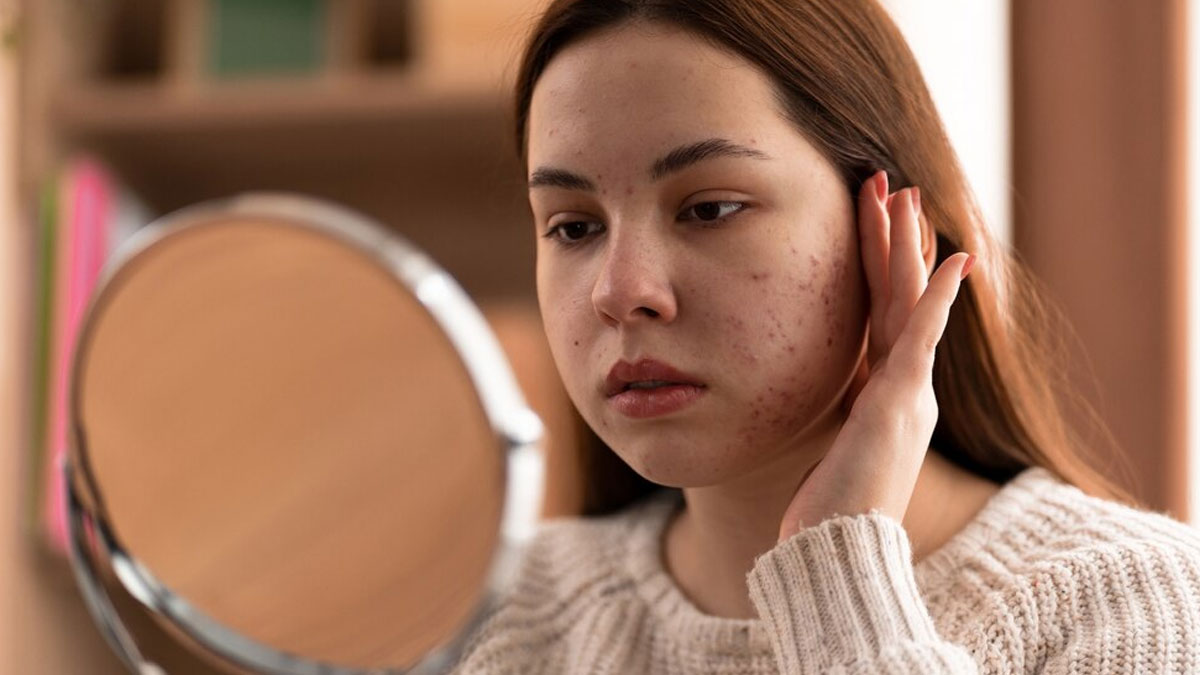
Have you ever found yourself frustrated because no matter how much you wash your face, those pesky breakouts keep showing up? Many of us experience this, often blaming our skincare products or genetics. But the truth is, our everyday choices, such as what we eat, how well we sleep, and how we handle stress, can significantly affect our skin. If you’re dealing with oily skin and frequent breakouts, it might be time to take a closer look at your lifestyle. Here are seven ways your unhealthy habits could be leading to those unwanted shine and blemishes, along with tips on how to turn things around.
Table of Content:-
Ways Your Unhealthy Lifestyle Can Cause Oily Skin and Breakouts
1. Poor Diet Choices

You can make a big difference to the appearance of your skin by eating the right foods. If you rely heavily on processed foods, sugary treats, or greasy fast food, you’re likely contributing to oily skin and clogged pores. Eating things like pizza, burgers, or sugary snacks can spike your blood sugar, causing your body to produce more insulin. This, in turn, signals your oil glands to work overtime, leading to excess sebum and, eventually, breakouts.
Hence, focus on a more balanced diet, which is packed with fresh fruits, vegetables, whole grains, and lean proteins. These foods can help stabilise your blood sugar and keep oil production in check. Adding foods rich in omega-3s, like salmon or walnuts, can also help reduce inflammation and improve your skin's health.
2. Lack of Proper Hydration
Another sneaky culprit when it comes to oily skin and breakouts is dehydration. When your skin is dehydrated, your body tries to compensate by producing more oil to keep your skin lubricated. This excess oil can easily clog pores, leading to acne.
Therefore, make sure you’re drinking enough water throughout the day. Staying hydrated not only helps regulate oil production but also flushes out toxins that could otherwise lead to breakouts.
Also Read: Post Workout Skincare: Expert Lists Effective Routine To Prevent Breakouts
3. Chronic Stress

You should remember that stress doesn't just affect your mind; it shows up on your skin, too. When you're stressed, your body releases cortisol, the stress hormone. High cortisol levels can increase oil production in your skin's sebaceous glands, leading to greasier skin and clogged pores.
Incorporate stress-relieving practices into your daily routine, such as yoga, meditation, or even a short walk. Managing stress can help keep your hormone levels balanced and prevent excess oil production.
4. Inconsistent Skincare Routine
Skipping your skincare routine or using the wrong products can have a significant impact on your skin. Not cleansing your face regularly allows dirt, oil, and dead skin cells to build up on your skin’s surface. As a result, pores can become clogged and acne can develop. On the other hand, using products that are too harsh or not suited for your skin type can strip your skin of its natural oils, prompting it to produce even more oil.
You should stick to a consistent skincare routine, including gentle cleansing, moisturising, and non-comedogenic products for your skin type. Avoid over-washing, which can irritate the skin and cause more oil production.
Also Read: From Dull Skin To Acne: Expert Explains How Your Face Reflects Vitamin Deficiencies
5. Lack of Sleep

Poor sleep can wreak havoc on your skin. Not getting enough rest disrupts your body’s ability to repair itself overnight, including skin cells. Sleep deprivation also triggers more cortisol production, which, as mentioned earlier, can lead to an increase in oil production and more breakouts.
Aim for at least 7-8 hours of quality sleep each night. Establish a calming bedtime routine, such as turning off electronics an hour before bed and creating a peaceful sleeping environment to ensure you get the rest your skin needs.
6. Excessive Alcohol and Caffeine Consumption
You might want to sip a glass of wine or a cup of coffee at times, however, consuming it in excess amounts can lead to dehydrated skin. When your skin becomes dehydrated, it compensates by producing more oil, which can clog pores and result in breakouts. Alcohol also dilates blood vessels and can cause skin inflammation, making breakouts even worse.
Therefore, limit your intake of alcohol and caffeine and balance it with plenty of water. If you notice your skin reacting after a night of heavy drinking or multiple cups of coffee, try cutting back to see if it improves.
7. Overexposure to Pollution and Sunlight
Environmental factors, like pollution and overexposure to sunlight, can damage your skin’s protective barrier and lead to oiliness and acne. Pollution particles clog pores, while UV rays from the sun stimulate oil production and can cause inflammation, increasing your chances of a breakout.
Protect your skin by wearing sunscreen daily and cleansing your face at the end of the day to remove dirt and pollutants. Using antioxidants like vitamin C in your skincare routine can also help fight the damage caused by pollution and sunlight.
[Disclaimer: This article contains information for informational purposes only, hence, we advise you to consult your own professional if you are dealing with any health issues to avoid complications.]
Also watch this video
How we keep this article up to date:
We work with experts and keep a close eye on the latest in health and wellness. Whenever there is a new research or helpful information, we update our articles with accurate and useful advice.
Current Version